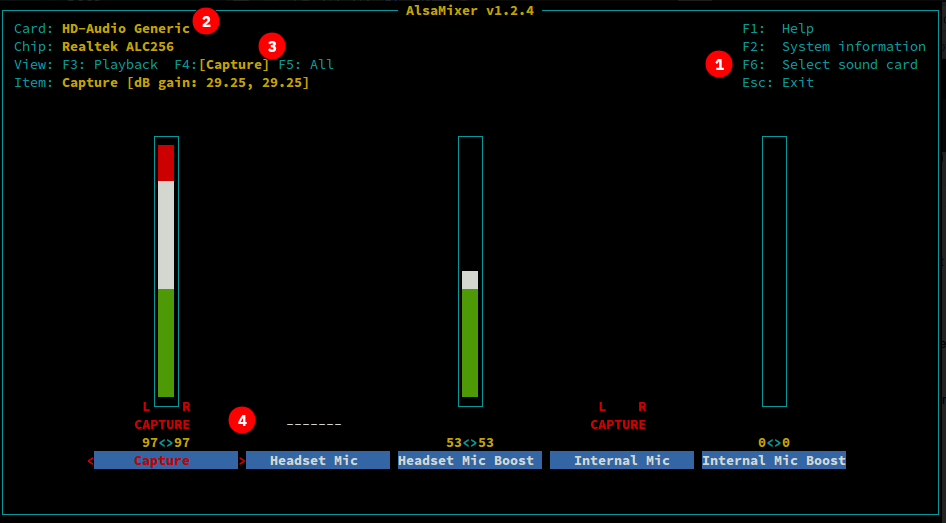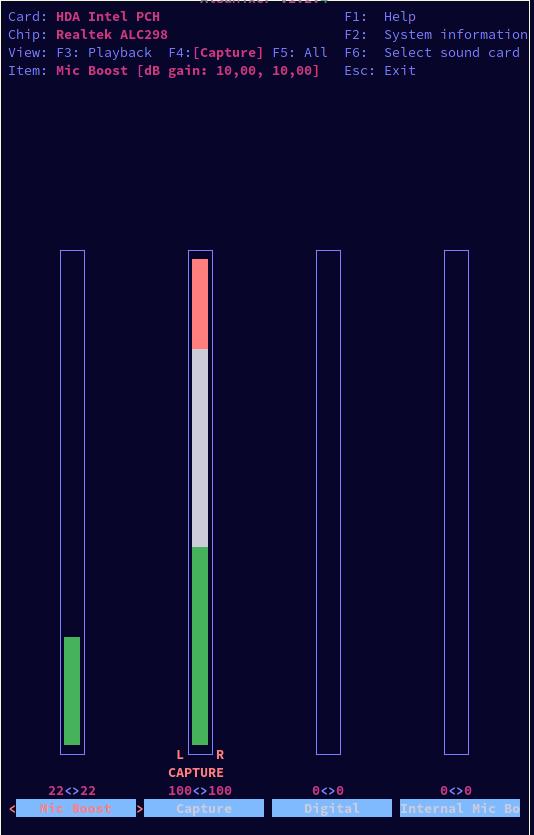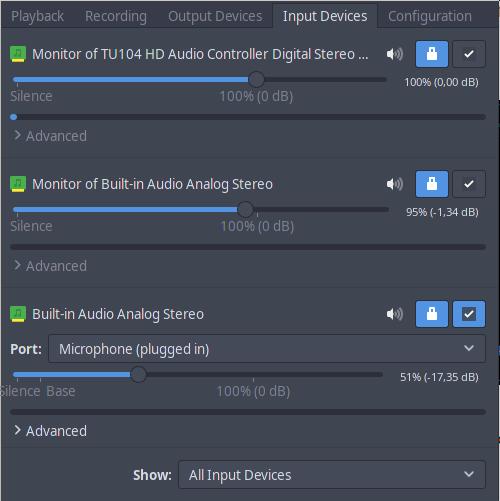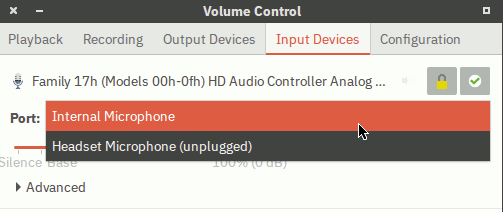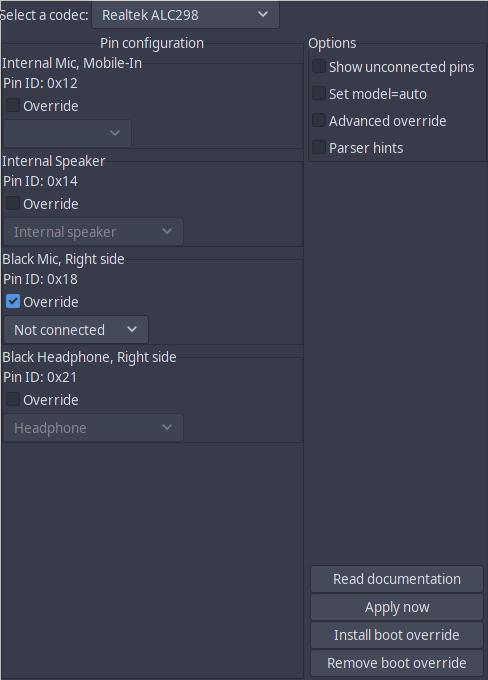Hello Spacemans 
I just moved from vanilla Arch since it was a bit too messy to setup a Razer Blade 15 Advanced Model (Early 2020) so I went ahead and tried a couple of distros but so far EnveavourOS really beats them all.
I went ahead and setup the i3 version with lightdm and optimus-manger to switch between cards and I installed the sof-firmware as it was suggested on the wiki, I setup pulseaudio and pavucontrol and everything was just working fine…until a week ago
As I boot my laptop and hop on a conference call on Skype I realize that my internal microphone is no longer active. I been trying to fix it for more than a week and looked everywhere but no luck
**pacmd list-sinks**
2 sink(s) available.
index: 0
name: <alsa_output.pci-0000_00_1f.3.analog-stereo>
driver: <module-alsa-card.c>
flags: HARDWARE HW_MUTE_CTRL HW_VOLUME_CTRL DECIBEL_VOLUME LATENCY DYNAMIC_LATENCY
state: SUSPENDED
suspend cause: IDLE
priority: 9039
volume: front-left: 26596 / 41% / -23,50 dB, front-right: 26596 / 41% / -23,50 dB
balance 0,00
base volume: 65536 / 100% / 0,00 dB
volume steps: 65537
muted: no
current latency: 0,00 ms
max request: 0 KiB
max rewind: 0 KiB
monitor source: 0
sample spec: s16le 2ch 44100Hz
channel map: front-left,front-right
Stereo
used by: 0
linked by: 0
configured latency: 0,00 ms; range is 0,50 … 2000,00 ms
card: 1 <alsa_card.pci-0000_00_1f.3>
module: 7
properties:
alsa.resolution_bits = “16”
device.api = “alsa”
device.class = “sound”
alsa.class = “generic”
alsa.subclass = “generic-mix”
alsa.name = “ALC298 Analog”
alsa.id = “ALC298 Analog”
alsa.subdevice = “0”
alsa.subdevice_name = “subdevice #0”
alsa.device = “0”
alsa.card = “0”
alsa.card_name = “HDA Intel PCH”
alsa.long_card_name = “HDA Intel PCH at 0x6044118000 irq 185”
alsa.driver_name = “snd_hda_intel”
device.bus_path = “pci-0000:00:1f.3”
sysfs.path = “/devices/pci0000:00/0000:00:1f.3/sound/card0”
device.bus = “pci”
device.vendor.id = “8086”
device.vendor.name = “Intel Corporation”
device.product.id = “06c8”
device.product.name = “Comet Lake PCH cAVS”
device.form_factor = “internal”
device.string = “front:0”
device.buffering.buffer_size = “352800”
device.buffering.fragment_size = “176400”
device.access_mode = “mmap+timer”
device.profile.name = “analog-stereo”
device.profile.description = “Analog Stereo”
device.description = “Built-in Audio Analog Stereo”
module-udev-detect.discovered = “1”
device.icon_name = “audio-card-pci”
ports:
analog-output-speaker: Speakers (priority 10000, latency offset 0 usec, available: unknown)
properties:
device.icon_name = “audio-speakers”
analog-output-headphones: Headphones (priority 9900, latency offset 0 usec, available: no)
properties:
device.icon_name = “audio-headphones”
active port:
- index: 4
name: <alsa_output.pci-0000_01_00.1.hdmi-stereo>
driver: <module-alsa-card.c>
flags: HARDWARE DECIBEL_VOLUME LATENCY DYNAMIC_LATENCY
state: SUSPENDED
suspend cause: IDLE
priority: 9030
volume: front-left: 65536 / 100% / 0,00 dB, front-right: 65536 / 100% / 0,00 dB
balance 0,00
base volume: 65536 / 100% / 0,00 dB
volume steps: 65537
muted: no
current latency: 0,00 ms
max request: 0 KiB
max rewind: 0 KiB
monitor source: 5
sample spec: s16le 2ch 44100Hz
channel map: front-left,front-right
Stereo
used by: 0
linked by: 0
configured latency: 0,00 ms; range is 0,50 … 1999,82 ms
card: 0 <alsa_card.pci-0000_01_00.1>
module: 6
properties:
alsa.resolution_bits = “16”
device.api = “alsa”
device.class = “sound”
alsa.class = “generic”
alsa.subclass = “generic-mix”
alsa.name = “HDMI 0”
alsa.id = “HDMI 0”
alsa.subdevice = “0”
alsa.subdevice_name = “subdevice #0”
alsa.device = “3”
alsa.card = “1”
alsa.card_name = “HDA NVidia”
alsa.long_card_name = “HDA NVidia at 0xa4080000 irq 17”
alsa.driver_name = “snd_hda_intel”
device.bus_path = “pci-0000:01:00.1”
sysfs.path = “/devices/pci0000:00/0000:00:01.0/0000:01:00.1/sound/card1”
device.bus = “pci”
device.vendor.id = “10de”
device.vendor.name = “NVIDIA Corporation”
device.product.id = “10f8”
device.product.name = “TU104 HD Audio Controller”
device.string = “hdmi:1”
device.buffering.buffer_size = “352768”
device.buffering.fragment_size = “176384”
device.access_mode = “mmap+timer”
device.profile.name = “hdmi-stereo”
device.profile.description = “Digital Stereo (HDMI)”
device.description = “TU104 HD Audio Controller Digital Stereo (HDMI)”
module-udev-detect.discovered = “1”
device.icon_name = “audio-card-pci”
ports:
hdmi-output-0: HDMI / DisplayPort (priority 5900, latency offset 0 usec, available: yes)
properties:
device.icon_name = “video-display”
device.product.name = "SAMSUNG
"
active port:
arecord -l
**** List of CAPTURE Hardware Devices ****
card 0: PCH [HDA Intel PCH], device 0: ALC298 Analog [ALC298 Analog]
Subdevices: 1/1
Subdevice #0: subdevice #0
My thoughts through my journey in fixing the mic:
- I don’t think is the kernel modules since I never added them and it worked just fine before
- I added the specific hardware device in the default.pa in /etc/pulse but that just changed the pavucontrol interface by showing me the devices I plugged in
- Having a hybrid setup might raise a problem in terms of device being active based on the card running (I am not sure if NVIDIA also includes a microphone channel
- I checked alsamixer to make sure that it wasn’t muted but it’s a bit confusing so maybe the problem has to do with the setup of alsa itself
